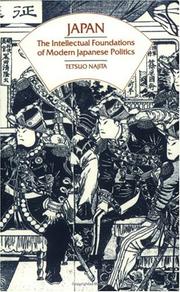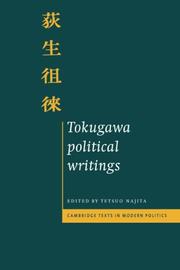| Listing 1 - 9 of 9 |
Sort by
|
Book
ISBN: 069110137X 0691053642 Year: 1982 Publisher: Princeton (N.J.) Princeton University Press
Abstract | Keywords | Export | Availability | Bookmark
 Loading...
Loading...Choose an application
- Reference Manager
- EndNote
- RefWorks (Direct export to RefWorks)
J3370 --- J3002 --- J3374 --- Japan: History -- Kindai, modern period (1868 [1850s]- ) --- Japan: History -- societies, organizations, congresses, periodicals --- Japan: History -- Kindai, modern -- Meiji period (1868-1912) -- imperial expansion --- Japan --- History --- -Congresses. --- Nihon --- Nippon --- Iapōnia --- Zhāpān --- I︠A︡ponii︠a︡ --- Yapan --- Japon --- Japão --- Japam --- Mư̄ang Yīpun --- Prathēt Yīpun --- Yīpun --- Jih-pen --- Riben --- Government of Japan --- 日本 --- 日本国 --- Nipponkoku --- Nippon-koku --- Nihonkoku --- Nihon-koku --- State of Japan --- Япония --- Japani --- اليابان --- al-Yābān --- يابان --- Yābān --- Japonsko --- Giappone --- Japonia --- Japonya --- Congresses. --- Jepun --- Yapon --- Yapon Ulus --- I︠A︡pon --- Япон --- I︠A︡pon Uls --- Япон Улс
Book
ISBN: 0226568040 0226568059 Year: 1987 Publisher: Chicago (Ill.) : University of Chicago press,
Abstract | Keywords | Export | Availability | Bookmark
 Loading...
Loading...Choose an application
- Reference Manager
- EndNote
- RefWorks (Direct export to RefWorks)
J4168 --- J4000.60 --- J4202.70 --- J1650 --- J1008.60 --- J4301 --- Merchants --- -Social sciences --- -Behavioral sciences --- Human sciences --- Sciences, Social --- Social science --- Social studies --- Civilization --- Businesspeople --- Japan: Sociology and anthropology -- communities, social classes and groups -- merchants --- Japan: Social history, history of civilization -- Kinsei, Edo, Tokugawa period, early modern (1600-1867) --- Japan: Sociology and anthropology -- communities -- social classes and groups -- merchants --- Japan: Philosophy -- ethics --- Japan: Philosophy -- history -- Kinsei, Edo, Tokugawa period, early modern (1600-1867) --- Japan: Economy and industry -- policy, legislation, guidelines, codes of behavior --- Intellectual life --- History --- Kaitokudō --- -Kaitoku Shoin --- Kaitokudō Merchant Academy of Osaka --- 懐徳 --- 懐徳堂 --- 懷徳堂 --- 懷德堂 --- Japan --- -Merchants --- Social sciences --- Intellectual life. --- History. --- -Japan: Sociology and anthropology -- communities, social classes and groups -- merchants --- -History --- -J4168 --- Behavioral sciences --- Kaitokudō --- Kaitoku Shoin --- Commerce

ISBN: 0226568032 Year: 1987 Publisher: Chicago (Ill.) : University of Chicago press,
Abstract | Keywords | Export | Availability | Bookmark
 Loading...
Loading...Choose an application
- Reference Manager
- EndNote
- RefWorks (Direct export to RefWorks)
S35/0600 --- S35/0900 --- J4610 --- J4600.70 --- J1008.70 --- #SML: Joseph Spae --- Japan--Law, politics and government --- Japan--Philosophy --- Japan: Politics and law -- theory, methodology and philosophy --- Japan: Politics and law -- history -- Kindai (1850s- ), bakumatsu, Meiji, Taishō --- Japan: Philosophy -- history -- Kindai (1850s-1945), Bakumatsu, Meiji and Taishō --- Japan --- Politics and government --- -S35/0600 --- -#SML: Joseph Spae

ISBN: 0521567173 0521561868 0511521537 Year: 1998 Publisher: New-York Cambridge University press
Abstract | Keywords | Export | Availability | Bookmark
 Loading...
Loading...Choose an application
- Reference Manager
- EndNote
- RefWorks (Direct export to RefWorks)
The modern political consciousness of Japan cannot be understood without reference to the history of the Tokugawa period, the era between 1600 and 1868 that preceded Japan's modern transformation. Tetsuo Najita introduces the ideas of the leading political thinker of the period, Ogyu Sorai (1666-1728), a pivotal figure in laying the conceptual foundations of Japan's modernization. His basic thoughts about history and the ethical purposes of politics are presented, revealing the richness of the philosophical legacy of eighteenth-century Japan, a legacy which cannot be seen through the perspective of 'westernization'. His ideas reveal a vision of human diversity and individual virtue which can be viewed in comparative perspective, as well as an insight into the history and politics of Japan. The texts are accompanied by a chronology of Sorai's life, a glossary, a guide to persons mentioned in the text, and a guide to further reading, as well as Professor Najita's introduction, which puts Sorai's work into philosophical and historical context.
Social Sciences --- Political Science --- Ogyū, Sorai, --- Sorai, Ogyū --- Butsu, Mokei, --- Disheng, Culai, --- Monobe, Mokei, --- Ogyū, Mokei, --- Ogyū, Nabematsu, --- Akagi-ō, --- Ken'en, --- Yōan, --- 荻生徂徠, --- 荻生徂徕, --- 荻生徂來, --- 荻生徂来,
Book
Year: 1967 Publisher: Cambridge Harvard university press
Abstract | Keywords | Export | Availability | Bookmark
 Loading...
Loading...Choose an application
- Reference Manager
- EndNote
- RefWorks (Direct export to RefWorks)
Book
ISBN: 9780520260382 Year: 2009 Publisher: Berkeley University of California Press
Abstract | Keywords | Export | Availability | Bookmark
 Loading...
Loading...Choose an application
- Reference Manager
- EndNote
- RefWorks (Direct export to RefWorks)
The author explores a powerful theme in the economic thought and practice of ordinary citizens in late Tokugawa and early modern Japan. He examines commoners' writings on the virtues of commerce, on the reconstruction of villages, and on groups offering credit and loans, particularly the traditional cooperative, the kō, which citizens created to save on another in times of famine and fiscal emergency without having to turn to their government. The author's discussion centers on the relationship among economics, ethics, and the epistemological premise that nature must serve as the first principle of all knowledge, and he illuminates comparative issues of poverty, capitalism, and modernity.
Book
ISBN: 9780521567176 9780521561860 9780511521539 Year: 1998 Publisher: Cambridge Cambridge University Press
Abstract | Keywords | Export | Availability | Bookmark
 Loading...
Loading...Choose an application
- Reference Manager
- EndNote
- RefWorks (Direct export to RefWorks)
Book
ISBN: 0226568016 Year: 1978 Publisher: Chicago University of Chicago press
Abstract | Keywords | Export | Availability | Bookmark
 Loading...
Loading...Choose an application
- Reference Manager
- EndNote
- RefWorks (Direct export to RefWorks)
Multi

ISBN: 9781400872909 9780691618647 069161864X Year: 2015 Publisher: Princeton, N.J. Princeton University Press
Abstract | Keywords | Export | Availability | Bookmark
 Loading...
Loading...Choose an application
- Reference Manager
- EndNote
- RefWorks (Direct export to RefWorks)
History --- Japan --- Economic conditions --- Politics and government
| Listing 1 - 9 of 9 |
Sort by
|

 Search
Search Feedback
Feedback About UniCat
About UniCat  Help
Help News
News